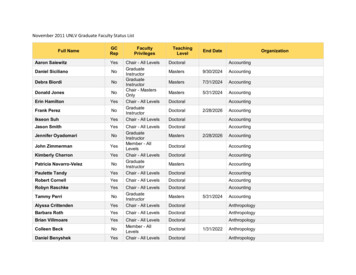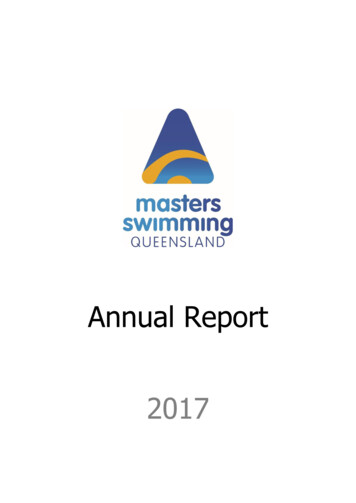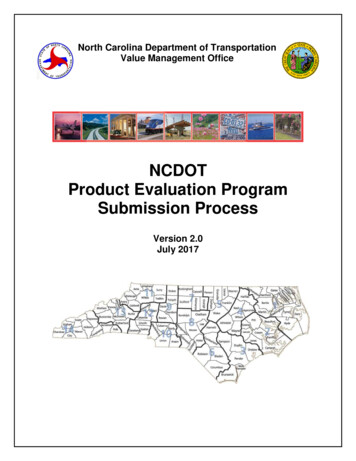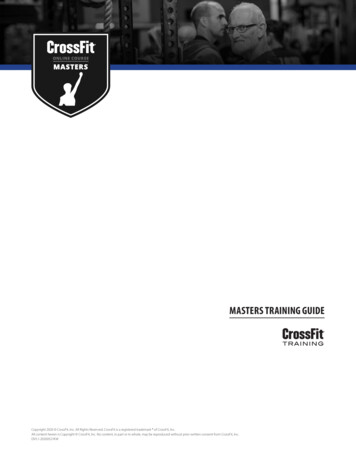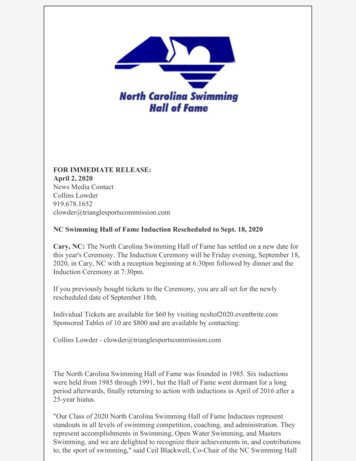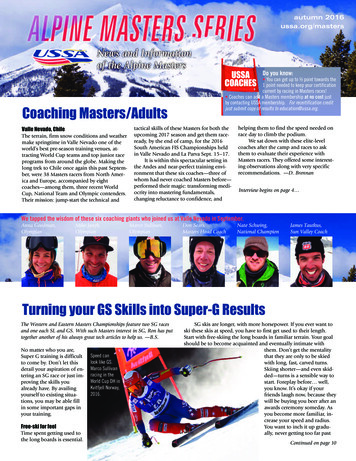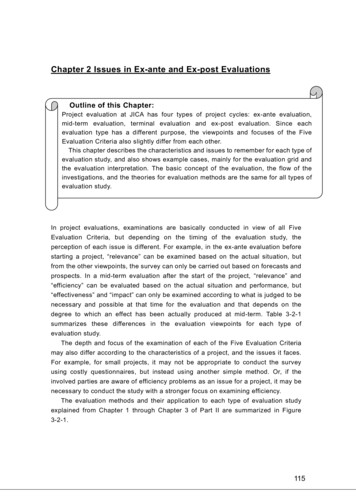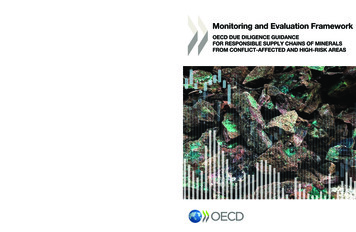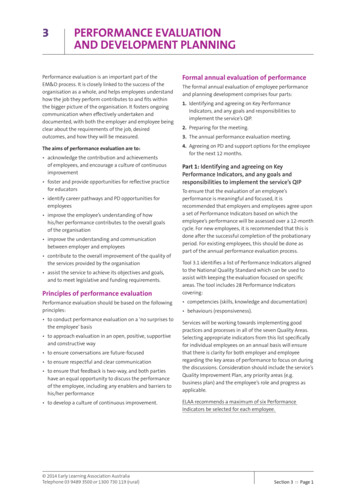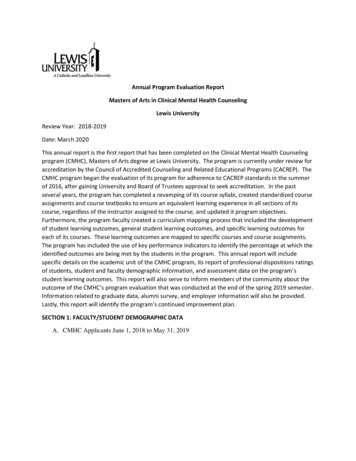
Transcription
Annual Program Evaluation ReportMasters of Arts in Clinical Mental Health CounselingLewis UniversityReview Year: 2018-2019Date: March 2020This annual report is the first report that has been completed on the Clinical Mental Health Counselingprogram (CMHC), Masters of Arts degree at Lewis University. The program is currently under review foraccreditation by the Council of Accredited Counseling and Related Educational Programs (CACREP). TheCMHC program began the evaluation of its program for adherence to CACREP standards in the summerof 2016, after gaining University and Board of Trustees approval to seek accreditation. In the pastseveral years, the program has completed a revamping of its course syllabi, created standardized courseassignments and course textbooks to ensure an equivalent learning experience in all sections of itscourse, regardless of the instructor assigned to the course, and updated it program objectives.Furthermore, the program faculty created a curriculum mapping process that included the developmentof student learning outcomes, general student learning outcomes, and specific learning outcomes foreach of its courses. These learning outcomes are mapped to specific courses and course assignments.The program has included the use of key performance indicators to identify the percentage at which theidentified outcomes are being met by the students in the program. This annual report will includespecific details on the academic unit of the CMHC program, its report of professional dispositions ratingsof students, student and faculty demographic information, and assessment data on the program’sstudent learning outcomes. This report will also serve to inform members of the community about theoutcome of the CMHC’s program evaluation that was conducted at the end of the spring 2019 semester.Information related to graduate data, alumni survey, and employer information will also be provided.Lastly, this report will identify the program’s continued improvement plan.SECTION 1: FACULTY/STUDENT DEMOGRAPHIC DATAA. CMHC Applicants June 1, 2018 to May 31, 2019
Applicants 2018-2019African AmericanAfrican American White or CaucasianAmerican Indian or Alaska NativeAmerican Indian White or CaucasianAsianNo ResponseWhite or CaucasianThe chart above is consistent with history of the demographic breakdown of program applicants for theCMHC program.B. CMHC Program Current Students 2018-2019Student Demographics 2018-201931729774120Caucasion/WhiteAfrican American/BlackAmerican Indian/Native AmericanAsian American/Pacific ed
Student Demographics19123MaleFemaleThe CMHC program is made up of a mix of racial, ethnic, gender, and sexual orientation, SES,disability, and minority diversity. Lewis University as a whole, along with the CMHMprogram, tends to have students from first-generation college, bi/multilingual,religious/spiritual, socioeconomic, and age diverse backgrounds. Many of the CMHCprogram students speak more than one language (e.g. Spanish, Polish, etc.).The data above shows the demographics that are tracked in the CMHC program. According to this data,roughly 54% of the student body is Caucasian/White, 20% is Hispanic/Latino/Spanish American, 8% isAfrican America/Black, 3% of the student body is Asian American/Pacific Islander, 2% is multiracial, and12% did not disclose their demographics. Students who identify as male account for 13% of the studentbody, whereas 87% of the student body identified as female.Furthermore, the University has a mentoring program known as Flyers Rise. This is a retention tool forstudents of color. Undergraduate and graduate students are included in this program. The currentDepartment of Psychology Graduate Assistant is a Cohort 4/Spring 2019 participant in the Flyer’s Riseprogram and was recruited by the University to be a part of this program. This graduate studentidentifies as African American.The chart below notes the age of the students in the CMHC program, with an average age of28.54. This data is consistent with the previous year’s average age of students in the program.
Student Demographics: Age120100806040200Under 3030-3940-4950 AgeA. Faculty-to-Student Ratio for 2018-20192018-2019 FTE 11.68Fall 2018Spring 2019Summer 2019Semester YearFall 2018Spring 2019*Summer 201911.8310.510.96FacultySemesters HoursTaught4 courses x 3credit hours 12full-time facultyhours taught persemesterStudent SemesterHours TakenFormulaStudent-toFaculty Ratio1279 credit hourscompleted/9(FTE) student 142 FTE students142 /12 FTEFaculty 11.8311.83 Students/1Faculty4 courses x 3credit hours 12full-time facultyhours taught persemesterOutside of facultycourse loadcontract1313 credit hourscompleted/9 FTEstudent 145145/12 FTEFaculty 10.510.5 Students/1Faculty863 credit hourscompleted/9 FTEstudent 95.8995.89/8.75 FTEFaculty10.96 Students/1Faculty
Faculty DemographicsFaculty Demographics 2018-20192.521.510.50African cialFemaleSECTION II: ASSESSMENT OF STUDENT LEARNING OUTCOMESThe Clinical Mental Health program conducts assessment of the student learning outcomes inspecific courses each semester. Student learning outcomes are measured by students’performance on particular assignments. Students are evaluated on behavioral dispositionsrelevant to specific assignments as well as all of the behavioral dispositions as a whole. EachStudent Learning Outcome (SLO is broken down into General Learning Outcomes [GLO] EachGLO is further broken down into Specific Learning Outcomes (sLOs) GLOs are further matchedwith specific assessment measures.Tk20 is a comprehensive data management system that allows student learning outcomes to beeasily assessed on multiple measures. Lewis University recently purchased Tk20 and began touse it in the fall 2018. This assessment database allows the University to collect, store, andanalyze data from each program. The CMHC program collects data on the following items:Lewis University Graduate Student Learning Objectives (GSLO’s), CMHC program StudentLearning Objectives, CMHC Professional Dispositions, and CMHC Key Performance Indicators.Each semester faculty members are instructed to score students on the data sent to their coursesvia the TK20 system. At the end of each semester, the artifacts stored in TK20 are scored andreports are generated outlining each student’s performance on the identified key performanceindicators.Below are graphs of some of the outcomes measured by the CMHC program. As the graphsshow, the majority of students met or exceeded expectations for each of the professionaldispositions charted below.
The CMHC program also assessed its’ identified key professional dispositions (KPI’s) through thecollection of specific assignments in the 2019-2020 course offerings. These assignments are collected inthe program TK20 data system. Based on the outcome of the data from these assignments, it was notedthat the majority of students in the CMHC program met or exceeded the indicators of success, asidentified by the chart below.Fall2018Question 1:9/9Met benchmark of 80% of students will pass the examination forquestions 2 and 3. Only 78% of students passed question 3.Question 2:9/9Question 3:7/9Spring2019Question 1:10/13Question 2:11/13Met benchmark of 80% of students will pass the examination forquestions 2 and 3. Only 76% of students pass question 3.
Question 3:14/15The chart above shows the data from the 2018-2019 academic year for the comprehensive examination.The comprehensive examination is the end of the program examination that measures student’scompetency in the following areas:1. A knowledge base in relevant areas of psychology and counseling, including personality,psychopathology, therapy, multicultural issues, and evaluation and assessment2. Skills in interviewing, assessment, and techniques of therapy.3. Awareness of clients individuality, multicultural sensitivity, and the importance of flexibility intheir work with clients4. Development of appropriate ethics and professional identificationThe examination includes three questions focused on the following areas: 1) clinical assessment, 2)conceptualization and theoretically-specific treatment planning, and 3) professional and ethical issues.Based on the data collected in fall 2018, 9 students completed the examination with a 100% passing ratefor the first two questions and a 78% passing rate for the third question. Based on the spring 2019 data,13 students completed questions 1 and 2 of the exam and 15 students completed question 3 of theexam. For the spring 2019 term, 7 students met the identified threshold on all three of the examquestions. Seven students fell below the identified threshold of 80% but received scores above 70%,and two students failed to meet the criteria. Nine students earned at or above the threshold of 80% forthe question. Two students earned above 70% but below the benchmark goal of 80%. Two studentsfailed to pass the examination.Student scores on this examination were assessed further based upon varying levels of passing scores. Itwas noted that two of the questions received lower passing scores. In addition to those two students,an additional two students received a failing score on the exam. Students were given feedback on theirresponses via email, mail, and in-person in order identify the area where improvements can be made tothe answers. Students who earned a conditional pass were asked to provide a follow-up response inorder to ensure that all students graduating from the program possess the ability to perform a higherlevel of functioning in the basic counseling skills required of the field.Key Modifications: The action plan designed to address the threshold for all of the questions not be metin the spring 2019 semester is as follows. Examination reviews will continue to be held in the fieldplacement courses. Students who did not meet the threshold will meet one-on-one with faculty toreview their responses and what needs to be done in order to earn a passing score. In addition, thecourses aligned with this assessment measure will be reviewed to determine what changes need to bemade or areas addressed in order to assist with students understanding of the assessment domainareas.The assessment data for the spring 2019 comprehensive examination did note a 14% improvement instudents’ scores compared to the spring 2018 semester.
Assessment of Applicants Behavioral and Professional Dispositions:Additional information obtained from applicant’s application to the program included the assessment oftheir personal statement, which is part of the application process. Applicant’s personal statements areassessed for adherence to the CMHC’s program’s behavior and professional dispositions. As can be seenin the chart below, applicants scored a mean of 1.42-2 on the various behavioral dispositions. This chartis just a snapshot of the applicant data collected in fall 2018.Personal Statement FA 2018 Ranking Behavioral Dispositions (Applicants)Student NameApplicant 1Applicant 2Applicant 3D1222D2212D3111D4221D5221D6221Applicant 4Applicant 5Applicant 2131.8571432222TOTAL:1413TOTAL MEAN:21.857143Section IV: Student, Alumni, Supervisor SurveysApplicant 11. Student Satisfaction SurveyA student satisfaction survey was disseminated in fall 2018. This survey was sent to all students in theCMHC program. A total of 110 students responded to the survey, which represents more than themajority of the students enrolled in the program for that semester. They survey assessed the followingareas: faculty support, curriculum evaluation, satisfaction with level of instruction, feelings ofpreparedness for employment, satisfaction with classroom experience. Based upon the findings, anoverwhelming majority of students rated the various categories on this survey as being highlysatisfied/satisfied with the programming and faculty of the program. These results support the successof the program’s current objectives and outcomes.The results from the survey are below:Student Satisfaction Survey Fall 2018Do you feel that the CMHC faculty are supportive of students in the CMHC program?StudentsYesNo88%12%
Do you feel like your knowledge of relevant areas of psychology and counseling, includingpersonality, psychopathology, therapy, and evaluation and assessment, have beenstrengthened since taking courses in the CMHC program?StudentsYesNo98%2%How satisfied are you with the level of instruction in the CMHC fiednorDissatisfied41%38%12%DissatisfiedVery Dissatisfied7%2%Please rate your classroom experience in the CMHC 40%8%1%0%
How well-prepared do you feel you are for a career in mental health based upon your educationin the CMHC program?A GreatDealPreparedStudentsModeratelyPreparedA LittlePreparedNot at AllPrepared48%13%2%37%Race canAmericanHispanic norAlaskaNativeNativeHawaiian orotherPacificIslander0%2%AnotherRace4%Current Concentration in ictionsChild/AdolescentAddictions10%9%
GenderStudentsMaleFemale15%85%SECTION III: GRADUATE DATA, ALUMNI SURVEY, EMPLOYMENTA. Graduate data and EmploymentB. Graduation Information:Average time to graduation3.08 yearsStudents who have earned a degree inCMHC program in 2018-2019During 2018-2019, 23 students completed the CMHC program. The current demographic data of theprogram’s applicants shows that the CMHC program has had a rather consistent number of studentsgraduate each year for the past decade. The program averages 14.7 student graduates each semester (falland spring). This number compares with the number of new students that the program orients each year.The ability to replace the number of students that the program graduates is a sign of healthy enrollment ofthe program.Fall 2018 Graduation: 2 students (plus an additional 6 students from August 2018)Spring 2019 Graduation: 15 studentsB. Alumni surveySince we are not yet CACREP accredited, we do not have a way to get our students’ pass rateson the NCE examination. However, an alumni satisfaction survey was distributed in fall 2018.A total of 71 alumni responded to the survey. The survey asked for the following information:licensing level, certifications held, employment, professional memberships, program satisfaction,field preparedness, and open ended questions that allowed respondents to write in additionalinformation related to program strengths and areas of improvement. Licensing67% had either the LPC or the LCPC23% had applied and were waiting to take the LPC/LCPC Certifications9.86% had their CADC2.82% had their CDVP
Employment82% were employed Professional Associations60% belonged to a professional association in the field of counseling Program Satisfaction56.34% reported being very satisfied with the program, 35.21% reported beingsatisfied with the program8.45% reported being neither satisfied nor dissatisfied with the program. Field Preparedness47.89% reported feeling a great deal preparedness42.25% reported feeling moderately prepared9.86% reported feeling a little prepared.The survey allowed for a written response for areas of program recommendations. These writtenresponses provide valuable data for faculty when determining areas of improvement and programstrengths.C. EmploymentThe program does not currently have data on the employment statistics of those graduates. Analumni survey was created for distribution in fall 2019 semester. The alumni survey will be usedto collect specific data on the programs graduates’ employment, licensing, and other areas ofprofessional development. Currently, data is collected in an informal means through sustainedfaculty-student relationships post-graduation, professional connections in social networkingareas, and common memberships in professional associations.D. Clinical Supervisor SurveyThe CMHC program conducted a survey of former site supervisors during spring 2019 term.The survey resulted in very few respondents. Of the former supervisors who did respond, thefollowing information was obtained. How prepared did you view Lewis CMHC students for the practicumexperience?75% of respondents stated a great deal prepared25% of respondents stated moderately prepared How do you rate Lewis CMHC students compared to other Universitystudents?25% of respondents stated slightly better prepared
75% of respondents state about the same as other students 100% of respondents stated that they would consider another Lewis CMHCstudent for their practicum experience.SECTION IV: PROGRAM MODIFICATIONS AND ACTIONSThe CMHC program began collection assessment data in the fall 2015 and continued throughthe fall 2019 semester. Over the course of 4 years of data collection, many modifications andimprovements have been made in the areas of program teaching methods, student needsassessment and overall level of satisfaction with the CMHC program, the developingprofessional needs of our students, and as well as the validity and effectiveness of ourevaluation efforts. Some of the findings of the analysis of the CMHC’s program evaluationwere as follows:1. Some of the data found that the CMHC program did not always measure what itthought it was measuring. For example, in addition to assessing Key PerformanceIndicators (KPIs), the CMHC program also attached certain assignments to itsBehavioral Dispositions. This strategy was not productive as it did not reallydifferentiate students' performance on the dispositions per assignment. Thus, in thefall 2019 semester the CMHC program refined this process and measured behavioraldispositions for specific courses as opposed to redundantly measuring them forspecific courses and chosen assignments. It found that measuring behavioraldispositions makes more sense as an indicator of overall performance in a course.Finally, through an internal review of the assessment processes, it was determined thatthe CMHC program neglected to seek students’ own feedback on where they feel theyare on our behavioral dispositions. This will now be implemented on students’ ownassessments of their performance on the dispositions at the beginning, middle, and endof the program and compared their results to those results determined by the faculty.Decreasing the redundancy in our assessment processes increases both the efficiencyand effectiveness of our evaluations. The streamlining of our data analyses allowedthe CMHC program to develop more specific concrete goals for continuousimprovement purposes.2. Dissemination of alumni survey: An alumni survey will be distributed every fall term forthe previous academic year. Data from the alumni survey will also be used to evaluateprogram objectives and student learning outcomes. The feedback from future graduateswill be valuable in determining specific modifications that will be advantageous for ourstudent’s post-graduation, addressing areas of need to ensure higher employment successrates, and areas of improvement for the field placement experience. Specific questions tobe addressed: did students have the technological resources necessary to be successfullyprepared for a career in counseling? What changes in the program would best help a studentobtain the knowledge and skills required for successful employment? What are therecommendations for improved student learning?
3. One area that has been noted for improvement is in the area of counselor identity for the students.The table below lists the various areas in the curriculum where counselor identity can beaddressed and improved upon.Foundational CoursesIntroduction to Clinical Mental HealthCounseling:Faculty mentoring for student submissions toICA’s CONTACT newsletter.Research in Counseling:Faculty mentoring for student submissions forICA fall conferences.Intermediate CoursesTreatment of Substance Abuse:Faculty mentoring in area of client advocacyAdvanced CoursesModels and Theories of Clinical Supervision:Increased student/faculty involvement in theIllinois Counselor Educators and Supervisorsdivision of the Illinois Counseling Association.Professional and Ethical Issues inCounseling:Student professional conferencepresentations at the University’s Celebrationof Scholarship, poster submissions to ICA’sfall conference.Practicum in Counseling:Faculty mentoring for student submissions toICA’s CONTACT newsletter
Masters of Arts in Clinical Mental Health Counseling Lewis University Review Year: 2018-2019 Date: March 2020 This annual report is the first report that has been completed on the Clinical Mental Health Counseling program (CMHC), Masters of Arts degree at Lewis University. The program is currently under review for
